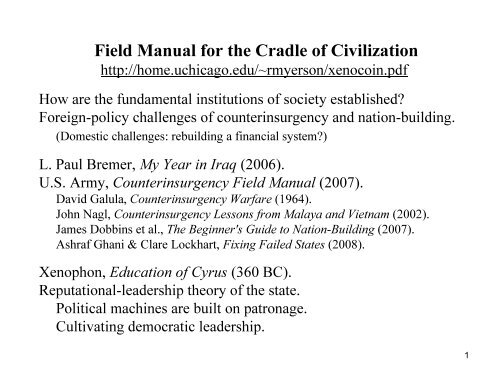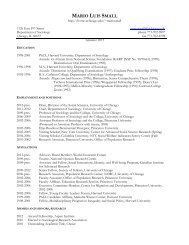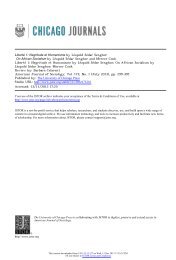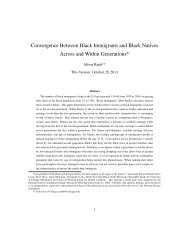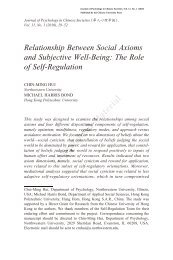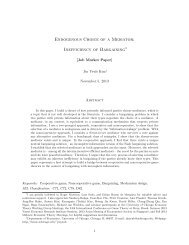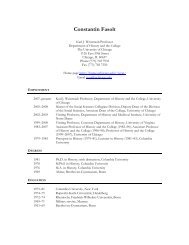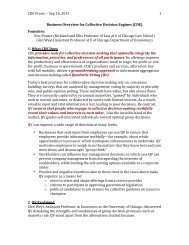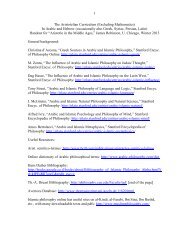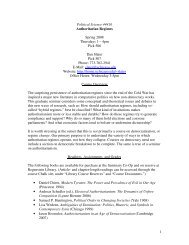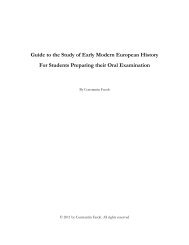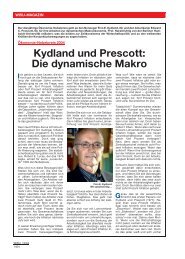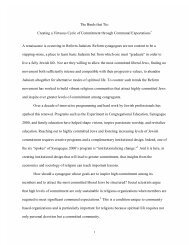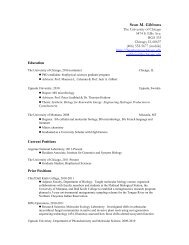Field Manual for the Cradle of Civilization - Personal Web Pages
Field Manual for the Cradle of Civilization - Personal Web Pages
Field Manual for the Cradle of Civilization - Personal Web Pages
You also want an ePaper? Increase the reach of your titles
YUMPU automatically turns print PDFs into web optimized ePapers that Google loves.
<strong>Field</strong> <strong>Manual</strong> <strong>for</strong> <strong>the</strong> <strong>Cradle</strong> <strong>of</strong> <strong>Civilization</strong><br />
http://home.uchicago.edu/~rmyerson/xenocoin.pdf<br />
How are <strong>the</strong> fundamental institutions <strong>of</strong> society established?<br />
Foreign-policy challenges <strong>of</strong> counterinsurgency and nation-building.<br />
(Domestic challenges: rebuilding a financial system?)<br />
L. Paul Bremer, My Year in Iraq (2006).<br />
U.S. Army, Counterinsurgency <strong>Field</strong> <strong>Manual</strong> (2007).<br />
David Galula, Counterinsurgency Warfare (1964).<br />
John Nagl, Counterinsurgency Lessons from Malaya and Vietnam (2002).<br />
James Dobbins et al., The Beginner's Guide to Nation-Building (2007).<br />
Ashraf Ghani & Clare Lockhart, Fixing Failed States (2008).<br />
Xenophon, Education <strong>of</strong> Cyrus (360 BC).<br />
Reputational-leadership <strong>the</strong>ory <strong>of</strong> <strong>the</strong> state.<br />
Political machines are built on patronage.<br />
Cultivating democratic leadership.<br />
1
Education <strong>of</strong> Cyrus (book 1, chapter 3, edited excerpt):<br />
When at dinner with his daughter and [her son] Cyrus, Astyages [King <strong>of</strong><br />
Media] wished <strong>the</strong> boy to dine as pleasantly as possible. He thus put<br />
be<strong>for</strong>e him fancy side dishes and all sorts <strong>of</strong> sauces and meats.<br />
Astyages said, "Does it not seem to you that this dinner is much finer than<br />
among <strong>the</strong> Persians?"<br />
To this Cyrus answered, "No, grandfa<strong>the</strong>r, <strong>for</strong> <strong>the</strong> road to satisfaction is much<br />
more simple and direct among us [Persians] than among you [Medes]."<br />
Astyages said, "Feast at least upon <strong>the</strong>se meats, so that you may go home a<br />
vigorous youth."<br />
Cyrus said, "Are you giving me all this meat, grandfa<strong>the</strong>r, to use however I<br />
want?" "Yes, my child, by Zeus I am," he said.<br />
Then Cyrus, taking <strong>the</strong> meat, distributed it to his grandfa<strong>the</strong>r's servants and<br />
said to each, "This is <strong>for</strong> you, because you teach me to ride with<br />
enthusiasm; <strong>for</strong> you, because you gave me a javelin; <strong>for</strong> you, because you<br />
serve my grandfa<strong>the</strong>r nobly; <strong>for</strong> you, because you honor my mo<strong>the</strong>r."<br />
He proceeded like this until he had distributed all <strong>the</strong> meat that he received.<br />
(Cyrus later usurped <strong>the</strong> throne <strong>of</strong> Media.)<br />
2
Xenophon, Education <strong>of</strong> Cyrus (360 BC)<br />
Cyrus established <strong>the</strong> Persian Empire on one essential quality <strong>of</strong><br />
leadership: a reputation <strong>for</strong> generously rewarding good service.<br />
Reputational equilibrium: Cyrus got benefits <strong>of</strong> power as long as he<br />
acted according to his reputation.<br />
(Did he really love justice, or <strong>the</strong> benefits <strong>of</strong> this reputation?)<br />
Thesis: Political organizations are established by recognized leaders<br />
who maintain reputations <strong>for</strong> reliably rewarding good service<br />
among a group <strong>of</strong> supporters.<br />
Applications:<br />
essential role <strong>of</strong> patronage,<br />
reputations as fundamental law,<br />
decentralization to promote democratic competition.<br />
3
Reputational-leadership <strong>the</strong>ory <strong>of</strong> <strong>the</strong> state<br />
Government is a network <strong>of</strong> agents with delegated powers,<br />
imperfectly monitored.<br />
Government agents could pr<strong>of</strong>it from abusing <strong>the</strong>ir power, and so<br />
<strong>the</strong>y must expect greater long-run rewards from good service.<br />
Agents' rewards depend on judgments <strong>of</strong> <strong>the</strong>ir superiors in <strong>the</strong><br />
network, and so incentives ultimately depend on top leaders.<br />
Promises <strong>of</strong> back-loaded rewards become a debt owed by <strong>the</strong> state,<br />
which leaders could be tempted to repudiate.<br />
So courtiers must monitor <strong>the</strong> distribution <strong>of</strong> <strong>of</strong>fices and rewards.<br />
The primary imperative in any political organization is to build and<br />
maintain a network <strong>of</strong> supporters who trust <strong>the</strong>ir leadership.<br />
(Becker-Stigler, J Legal Stud '74; Alchian-Demsetz, AER '72; my APSR '08.)<br />
4
Richard FitzNigel, Dialogue <strong>of</strong> <strong>the</strong> Exchequer (c. 1180)<br />
Why is <strong>the</strong> Exchequer so called?<br />
Because <strong>the</strong> table resembles a<br />
checker board. Moreover, just<br />
as a battle between two sides<br />
takes place on a checker<br />
board, so here too a struggle<br />
takes place, and battle is<br />
joined chiefly between two<br />
persons, namely <strong>the</strong> Treasurer<br />
and <strong>the</strong> Sheriff who sits to<br />
render account, while <strong>the</strong><br />
o<strong>the</strong>r <strong>of</strong>ficials sit by to watch<br />
and judge <strong>the</strong> proceedings.<br />
5
L. Paul Bremer, My Year in Iraq (2006)<br />
Bremer's <strong>the</strong>ory <strong>of</strong> democracy: primacy <strong>of</strong> <strong>the</strong> constitution,<br />
pr<strong>of</strong>essionalization <strong>of</strong> <strong>the</strong> security <strong>for</strong>ces.<br />
"I've got three 'red lines': We must leave behind a pr<strong>of</strong>essional<br />
uncorrupt police <strong>for</strong>ce, attentive to human rights; we must not<br />
have an army involved in internal affairs, and no militia; we<br />
should pass sovereignty to an Iraqi government elected on <strong>the</strong><br />
basis <strong>of</strong> a constitution."<br />
Bremer versus Ayatollah al-Sistani:<br />
Which comes first, constitutional laws or elected leaders?<br />
Xenophon and American history support Sistani.<br />
Asking Iraqi leaders to endorse policies and write <strong>the</strong> constitution,<br />
but giving <strong>the</strong>m few opportunities <strong>for</strong> patronage.<br />
Training police and soldiers to obey civilian constitutional authority<br />
be<strong>for</strong>e any civilian constitutional authority existed.<br />
6
U.S. Army & Marine Corps,<br />
Counterinsurgency <strong>Field</strong> <strong>Manual</strong> FM 3-24 (2007).<br />
Military operations with political follow-up to establish and expand<br />
areas <strong>of</strong> control (spreading oil spots).<br />
Promote security and effective governance to establish legitimate rule,<br />
with pr<strong>of</strong>essionalism, avoiding corruption and favoritism.<br />
David Galula's (1964) summary <strong>of</strong> counterinsurgency warfare:<br />
"(Re)build a political machine from <strong>the</strong> population upward."<br />
John Nagl (2002): US Army's tragic failure to learn this in Vietnam.<br />
But political machines are built on patronage.<br />
Counterinsurgents and state-builders may need a reputation <strong>for</strong><br />
reliable favoritism, but demanding per<strong>for</strong>mance.<br />
7
Political machines are built on patronage<br />
Supporters facing risk <strong>of</strong> attack must expect a pr<strong>of</strong>itable relationship.<br />
"Winning hearts & minds" = "local service is well paid & protected".<br />
Zamindars in colonial India: political benefits and economic costs <strong>of</strong><br />
feudalism. (A. Banerjee & L. Iyer, Amer.Econ.Rev., 2005).<br />
Roots <strong>of</strong> underdevelopment in foundations <strong>of</strong> <strong>the</strong> state.<br />
Insurgents also build on trust: Bin Laden as reliable paymaster.<br />
Host-government leaders seem airbrushed out <strong>of</strong> FM.<br />
Bremer & FM’s bottom-up training <strong>of</strong> security <strong>for</strong>ces<br />
is opposite <strong>of</strong> Maoist discipline from top leadership.<br />
Galula: Single boss must direct military, law-en<strong>for</strong>cement, and<br />
political operations.<br />
US <strong>for</strong>ces created local leaders without national political sponsors.<br />
Multiparty democracy could help ensure inclusion <strong>of</strong> new local elites.<br />
8
Cultivating democratic leadership<br />
Democratic competition should limit political pr<strong>of</strong>its (corruption),<br />
but it can fail if nobody has a reputation <strong>for</strong> good governance.<br />
Successful democracy requires many leaders with good reputations<br />
<strong>for</strong> serving <strong>the</strong> public, not just rewarding supporters.<br />
Political decentralization creates more opportunities to build such<br />
good reputations. (Contrast Bremer in Iraq 2003; my QJPS '06.)<br />
Building infrastructure may be less important than increasing <strong>the</strong><br />
supply <strong>of</strong> leaders whom people can trust with public funds, by<br />
distributing local responsibility with transparent accountability.<br />
National leaders have incentive to centralize, to reduce competition.<br />
(Russia 2004.)<br />
9
Building on strengths <strong>of</strong> democracy<br />
A leader becomes committed to democracy when his violating<br />
democratic norms would shock his supporters.<br />
When many politicians have democratic reputations, one who does<br />
not can have more difficulty recruiting supporters and allies.<br />
Federal decentralization enhances national democratic competition, as<br />
responsible local leaders can prove qualifications <strong>for</strong> higher <strong>of</strong>fice.<br />
National party competition streng<strong>the</strong>ns local democracy, as different<br />
parties can nominate challengers to established local leaders.<br />
Summary. Protect and cultivate responsible local leaders in<br />
communities throughout <strong>the</strong> nation, and bring <strong>the</strong>m into a<br />
democratic system <strong>of</strong> national political networks that extend out to<br />
reach all <strong>of</strong> <strong>the</strong> population.<br />
10
http://home.uchicago.edu/~rmyerson/xenocoin.pdf<br />
11
J. Dobbins et al, The Beginner's Guide to Nation-Building (2007)<br />
Plan. Match means to ends; greater change requires more <strong>for</strong>ces and resources.<br />
Prioritize: First priorities are military control, and humanitarian relief.<br />
Then disarm and reintegrate surplus combatants, and establish law en<strong>for</strong>cement<br />
(police, judges & prosecutors, prisons).<br />
Then build systems <strong>of</strong> governance. Responsible local <strong>of</strong>ficials and finance ministry<br />
are primary essentials.<br />
Consider introducing local democracy be<strong>for</strong>e national democracy.<br />
Longer term: help build infrastructure <strong>for</strong> economic development, but plan to<br />
gradually reduce international budgetary assistance.<br />
Controls are scarce and costly resources in nation-building.<br />
Need per million people: 3000 local soldiers, 2000 to 13000 international soldiers;<br />
2300 police, 230 to 1600 internat'l police; 60 judges, 60 prosecutors, 420 penal<br />
staff in 4 prisons, 12 internat'l judicial advisors. Elections cost $12/voter.<br />
Government services (education, public health, gen'l admin) cost 10.4% GDP.<br />
Infrastructure investment may be 40% GDP initially, 20% after 5 years.<br />
Internat'l assistance pays most <strong>of</strong> budget at first, 40% at 5 years, 25% at 7 years.<br />
12
A. Ghani & C. Lockhart, Fixing Failed States (2008)<br />
A sovereign state has rights and obligations both in relation to its citizens and in<br />
relation to <strong>the</strong> international community.<br />
In a successful society, rule <strong>of</strong> law supports <strong>the</strong> creation <strong>of</strong> productive resources,<br />
and <strong>the</strong> state's organizational capacity sustains <strong>the</strong> rule <strong>of</strong> law.<br />
A successful state's central policy instrument is its budgetary system <strong>for</strong> setting<br />
priorities and allocating resources with effective control and accountability.<br />
International aid projects, without local accountability, circumscribe and undermine<br />
<strong>the</strong> state budget's role in allocating public resources.<br />
International assistance should be a catalyst <strong>for</strong> building effectiveness and<br />
accountability <strong>of</strong> <strong>the</strong> state. (Catalysts depart when <strong>the</strong> action is done.)<br />
The first focus in development must be on building <strong>the</strong> state's organizational<br />
capacity, by cultivating local stakeholders in <strong>the</strong> state's administrative systems.<br />
Their human capital is <strong>the</strong> lifeblood <strong>of</strong> society.<br />
Afghanistan's National Solidarity Program gives $20,000 to every village <strong>for</strong> a<br />
budget set by a locally elected council, with accounts posted in a public place.<br />
Foreign organizations regularly pay chauffeurs over 10 times a civil servants' salary.<br />
13
Counterinsurgency <strong>Field</strong> <strong>Manual</strong>:<br />
Building Trusted Networks (A-26 to A-30)<br />
Once <strong>the</strong> unit settles into <strong>the</strong> area <strong>of</strong> operations, its next task is to build<br />
trusted networks. This is <strong>the</strong> true meaning <strong>of</strong> <strong>the</strong> phrase "hearts and<br />
minds." "Hearts" means persuading people that <strong>the</strong>ir best interests are<br />
served by COIN success. "Minds" means convincing <strong>the</strong>m that <strong>the</strong> <strong>for</strong>ce<br />
can protect <strong>the</strong>m and that resisting it is pointless. Calculated self-interest<br />
is what counts.<br />
Trusted networks include local allies, community leaders, and local security<br />
<strong>for</strong>ces.<br />
Building trusted networks begins with conducting village and neighborhood<br />
surveys to identify community needs. Then follow through to meet <strong>the</strong>m,<br />
build common interests, mobilize popular support. This is <strong>the</strong> true main<br />
ef<strong>for</strong>t; everything else is secondary.<br />
Start from secure areas and work gradually outwards. First, win <strong>the</strong><br />
confidence <strong>of</strong> a few villages, and <strong>the</strong>n work with those with whom <strong>the</strong>y<br />
trade, intermarry, or do business.<br />
14
Counterinsurgency <strong>Field</strong> <strong>Manual</strong> (paragraph 1-14):<br />
Killing insurgents - while necessary, especially with respect to extremists - by<br />
itself cannot defeat an insurgency.<br />
Gaining and retaining <strong>the</strong> initiative requires counterinsurgents to address <strong>the</strong><br />
insurgency's causes through stability operations as well.<br />
This initially involves securing and controlling <strong>the</strong> local population and providing<br />
<strong>for</strong> essential services.<br />
As security improves, military resources contribute to supporting government<br />
re<strong>for</strong>ms and reconstruction projects.<br />
As counterinsurgents gain <strong>the</strong> initiative, <strong>of</strong>fensive operations focus on eliminating<br />
<strong>the</strong> insurgent cadre, while defensive operations focus on protecting <strong>the</strong> populace<br />
and infrastructure from direct attacks.<br />
As counterinsurgents establish military ascendancy, stability operations expand<br />
across <strong>the</strong> area <strong>of</strong> operations and eventually predominate.<br />
Victory is achieved when <strong>the</strong> populace consents to [recognizes] <strong>the</strong> government's<br />
legitimacy and stops actively and passively supporting <strong>the</strong> insurgency.<br />
CERP: Commanders' Emergency Response Program (money as a weapon system).<br />
15
Political legitimacy is a general expectation <strong>of</strong> power which becomes self-fulfilling.<br />
Power as focal arbitration authority in social coordination games (ownership).<br />
(Schelling, 1960. Myerson, Chgo J Intl Law, 2004.)<br />
Contests to take power as coordination games among captains (my APSR '08).<br />
16


